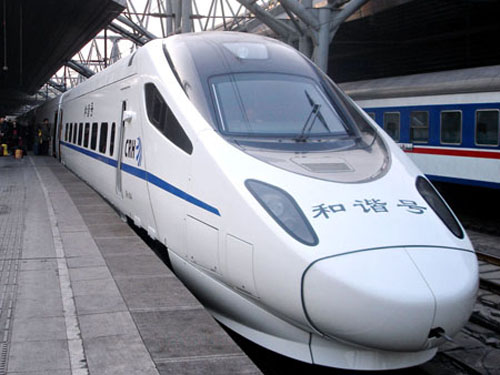Scandal of high-cost, high-speed railways
 0 Comment(s)
0 Comment(s) Print
Print E-mail Shanghai Daily, February 21, 2012
E-mail Shanghai Daily, February 21, 2012
China's bullet train system is raising questions again after media reports claimed equipment onboard was bought at prices much higher than the market rate.
 |
|
A high-speed train [file photo] |
An investigation by Century Weekly magazine into a purchase list of suppliers of parts for the CRH2 bullet train hinted at behind-the-scene deals and corruption during transactions.
China's bullet trains have been the subject of a series of scandals involving corruption, some of which are still under investigation.
Liu Zhijun, the former head of the state railway administration, was sacked amid a graft probe last year. Liu was said to have taken bribes from Ding Shumiao, a businesswoman in Shanxi Province, to give her priority in train equipment contracts.
Century Weekly reported that the purchase list, although not yet confirmed as genuine by train builders and railway authorities, showed that many items, such as seats and washstands, were bought at prices "several times higher than the retail price."
The list included the names, codes and types and prices of more than 3,000 pieces of equipment and materials needed on bullet trains.
CRH2 trains, produced by China South Locomotive & Rolling Stock Corporation (CSR) and a Japanese company, have been widely used on routes including the Shanghai-Nanjing and Beijing-Tianjing lines.
The magazine said that the cost of a single seat was about 30,000 yuan (US$4,763) and a double seat 40,000 yuan. The price of a VIP seat soared to 160,000 yuan. But it found similar products from other manufacturers at about a third lower.
The suppliers who won the bid to provide seats were two companies which "were seldom heard of before," said the report.
Insiders told the magazine that the companies had "a strong background and guanxi, or connections, in the industry."
The companies, which the magazine said had been losing money previously, shot into profit after bullet trains went into service.
A major shareholder in one of the companies was related to Ding, the report said. It also said Ding had met with the management of the company in 2006.
The washrooms onboard the trains were said to be another area where prices exceeded the market rate.
A washstand cost more than 20,000 yuan, the magazine said, about four times the market price.
With the addition of other items, equipping a washroom could cost anything from 300,000 yuan to 1.2 million yuan.
To make matters worse, some equipment was found to be broken or worn out soon after it was put into use. A CSR spokesman told the magazine that when anything needed repair, the suppliers acted "cold and indifferent."
The report alleged that high-ranking railway officials actually set prices and then selected specific suppliers with which they were connected or helped them with their bids.
In the end, it is the public who pays the price, the magazine said, by buying tickets which ranged from 550 yuan to 1,750 yuan.





